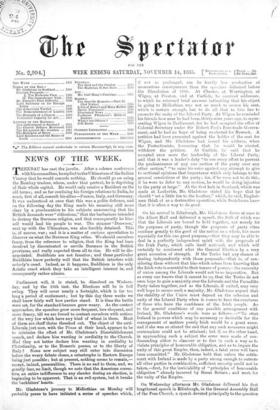Mr. Gladstone's journey to Midlothian on Monday will probably prove
to have initiated a series of speeches which,
if not so prolonged, can be hardly less productive of momentous consequences than the speeches delivered before the Dissolution of 1880. At Chester, at Warrington, at Wigan, at Preston, and at Carlisle, he received addresses, to which he returned brief answers intimating that his object in going to Midlothian was not so much to secure his seat, which is certain enough, but to do all that in him lies to promote the unity of the Liberal Party. At Wigan he reminded his friends how near he had been, thirty-nine years ago, to repre- senting Wigan in Parliament, for he had accepted the office of Colonial Secretary under Sir Robert Peel's Free-trade Govern- ment, and he had no hope of being re.elected for Newark. A petition had been presented against the holder of the seat for Wigan, and Mr. Gladstone had issued his address, when the Protectionists, foreseeing that he would be elected, withdrew the petition. At Carlisle, he said that he accepted once more the leadership of the Liberal Party, and that it was a leader's duty "to use every effort to prevent the predominance of any one section of the party over any other section," "to raise his voice against any attempt to give to sectional opinions that importance which only belongs to the general convictions of the party; for, if he were not to do this, if he were to defer to any section, he would be doing injustice to the party at large." At the first halt in Scotland, which was made at Lockerbie, Mr. Gladstone stated his hope that he should "set a little fire to the heather," which, he said, English- men think of as a destructive operation, while Scotchmen know that it is often a way to do good.






































